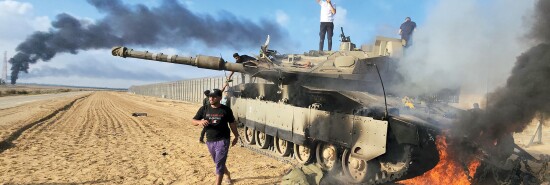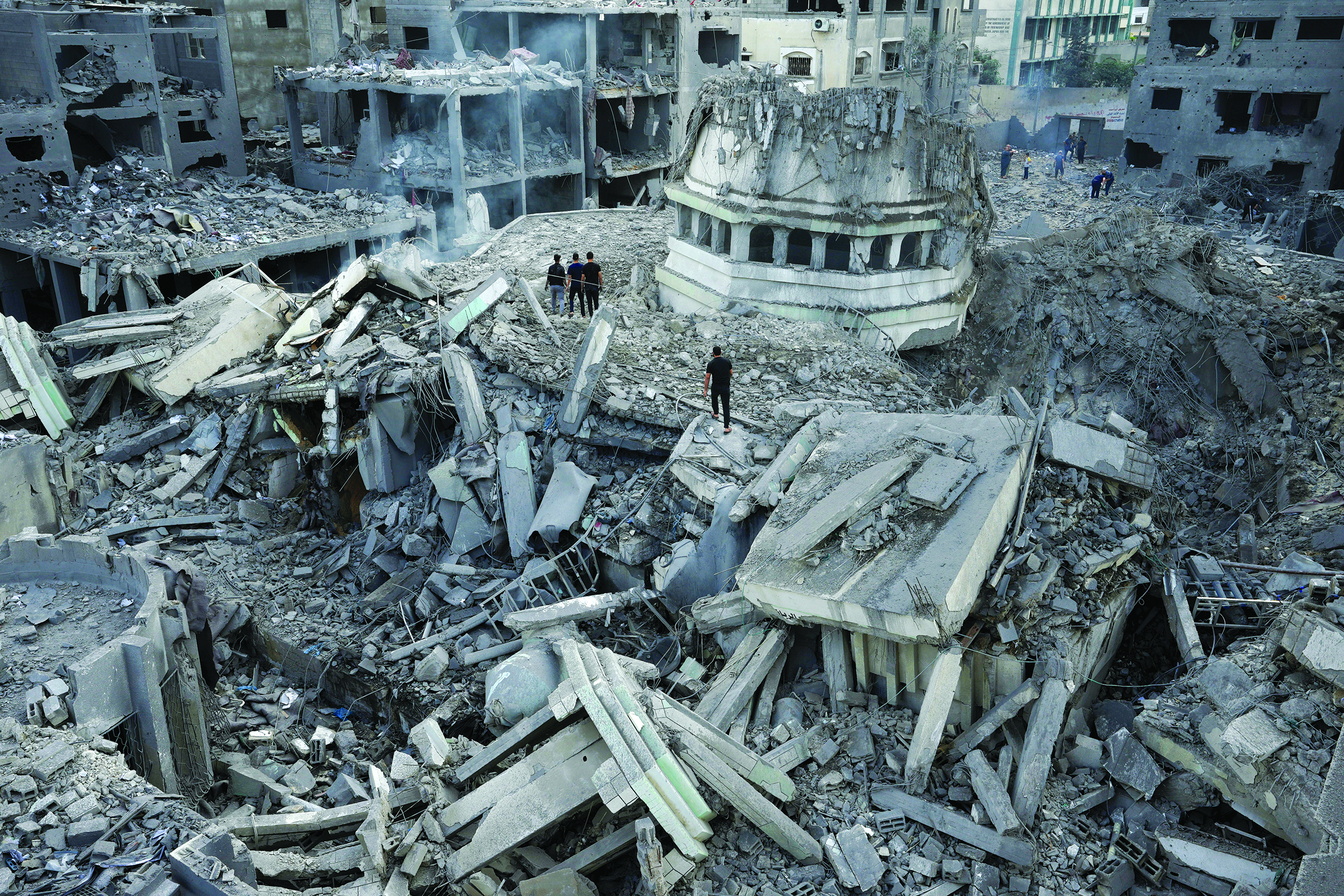
A clarifying moment for the West
Michael M. Rosen
“In the event of an air-raid siren during the ceremony,” we were told earlier this week, at the second funeral we’d attended in as many days for victims of Hamas’s brutal assault, “spread out, lie on the ground, and cover your heads.”
It was reasonable to expect the genocidal regime to shoot missiles at funeral attendees, given the barbarous attack its terrorists had inflicted on Israeli civilians just days earlier. In its savage invasion beginning on the morning of Oct. 7, Hamas murdered more than 1,000 innocents, injured more than 3,000, and abducted more than 100. Terrorists beheaded babies, burned children alive, raped young girls, and kidnapped grandmothers. “I never really thought that I would … have confirmed pictures of terrorists beheading children,” President Joe Biden said later that week. It was the deadliest day for Jews since the Holocaust. Hamas’s methods, and the sheer number of Israeli civilians to which they were applied, shocked the world.
AMERICAN HONEYMOONERS REVEAL MAD SCRAMBLE TO ESCAPE ISRAEL AFTER HAMAS TERROR ATTACK
Falling for the mask
I lived most of my life in the United States before relocating to Israel with my family nine years ago, personally witnessing how both Israel and the rest of the Western world deluded themselves into believing we can manage, handle, and negotiate with evil. This delusion proved seductive to policymakers across the political spectrum and resulted less from their malign intentions than from naive hopefulness. Nevertheless, we have lost confidence in, and thus compromised, our otherwise irreducible belief in the importance of freedom.
It is a betrayal of our ideals and our history. In particular, Israel, the U.S., and the United Kingdom share common liberal democratic roots and cultures that position us all to reinforce and assert our beneficent values. Israel’s establishment was an outgrowth of the British Mandate, which endured for three decades and helped form many Israeli institutions, including its parliament, court system, and military ethos. And Israel and the U.S., unlike most nation-states, were founded through declarations of independence that articulated core principles of liberty, justice, and political rights. We therefore share a collective responsibility to stand up for those ideals.

And we are an imperfect but successful demonstration of that worldview in practice. Between Hamas’s onslaught in Israel, Russia’s malevolent invasion of Ukraine, and China’s saber-rattling against Taiwan, the free world appears to be in its gravest peril since the end of the Cold War. But Israel and the West cannot despair. Collectively, we remain by far the most economically and militarily powerful alliance in the history of the world. Our core values, including individual freedom, economic prosperity, and religious and social pluralism, remain the most attractive set of ideas on offer anywhere. When given the choice, people choose our way and countries choose our friendship. We must therefore promote and disseminate our values confidently and vigorously.
In contrast, the very fact that Hamas’s capabilities were so surprising testifies to the sorry condition of its tyrannical statelet. The billions poured into Gaza from abroad are used for the furtherance of Hamas’s authoritarianism and war-making rather than basic services and infrastructure for the Palestinians there. Its failure is why the line is to get out of Gaza, not in.
Nor was there reason to believe its governance would change dramatically. For decades, peace activists have insisted that Hamas, once in power, would moderate its behavior and act responsibly, and Israeli officials have taken the bait. Once in charge of the levers of government and accountable to the populace, this school of thought contended, the Islamists will have no choice but to focus on domestic politics, seek international legitimacy, and keep the peace. With the emergence of even more extreme groups in Gaza, such as the Palestinian Islamic Jihad, Hamas would surely play the good cop.
For instance, in 2010, the Peace Research Institute Oslo extolled the virtues of Hamas’s proposed hudna, or long-term ceasefire, which aims “to resolve a conflict by forcing the parties to use the ascribed period to seek a nonviolent resolution to their differences.” In 2018, the Times of Israel reported that, according to senior diplomatic officials, “Israel has given up on its demand that Hamas, the terror group ruling the Gaza Strip, demilitarize.”

In 2021, the president of the Israel Democracy Institute suggested that since, “de facto, we already recognize Hamas’s sovereignty,” Israel’s goal “should be to reach a long-term ceasefire agreement” that would “require Israel’s leaders to be brave enough to admit that, in effect, they recognize Hamas and thus are willing to ‘do business’ with it.” The following year, after Hamas stayed out of a skirmish between Israel and the Palestinian Islamic Jihad, senior Israeli diplomatic sources told Globes that there was a chance for quiet and the return of prisoners in exchange for “de facto renunciation of the idea of toppling Hamas and acceptance of a continuing strategic threat from the Gaza Strip.”
As recently as June, a scholar at Tel Aviv University’s Institute for National Security Studies urged Israel to “continue with the current format of quiet arrangements vis-à-vis Hamas,” including by “reducing the threat posed by Gaza and providing for the daily needs of its population while trying to improve the situation in the region.” He went on to argue that “Hamas has demonstrated far-reaching pragmatism toward the conflict with Israel — for the benefit of the Gaza population and the Palestinians in general.”
The same goes for its patrons. Last year, the White House named Qatar, which harbors and funds Hamas, “a major non-NATO ally.” And when it comes to Iran, which funds and trains Hamas and Hezbollah fighters and routinely calls for Israel’s destruction, administrations as far back as Jimmy Carter’s have embraced dialogue, with former President Barack Obama urging U.S. allies to “share” the Middle East with the mullahs. The nuclear deal his White House struck with Iran put tens of billions of dollars in the ayatollahs’ coffers, in the hopes they would be used for social services.
The mask falls
That mask fell on Saturday, Oct. 7, as Hamas expressed, in deed and in word, its authentic, murderous goals. It launched its attack, meticulously planned for years, including by building and training on a mock Israeli town within Gaza, 50 years and one day after two Arab armies initiated the Yom Kippur War. “Hamas used an unprecedented intelligence tactic to mislead Israel over the last months,” a source in the terror group told Reuters, “by giving a public impression that it was not willing to go into a fight or confrontation with Israel while preparing for this massive operation.” The Wall Street Journal reported that “officers of Iran’s Islamic Revolutionary Guard Corps had worked with Hamas since August to devise the air, land and sea incursions.” Hamas has gleefully and pointedly posted videos of the massacre it perpetrated as a point of pride.
The mask also fell from the faces of the terrorists’ mendacious supporters across the Western world. Following the bestial attack, Hamas’s active backers and useful idiots alike expressed solidarity with the butchers. “Victory to the Palestinians,” proclaimed Quaker and Socialist Workers Party posters plastering Manchester University’s campus. “Gas the Jews!” chanted hundreds of pro-Palestinian activists in Sydney. “What did y’all think decolonization meant?” a Teen Vogue columnist wrote in a widely shared post on X, formerly known as Twitter. Some 30 student groups at Harvard University signed a joint statement “hold[ing] the Israeli regime entirely responsible for all unfolding violence,” and the university itself declined to condemn either this morally reprehensible statement or Hamas itself.

A perfect encapsulation of this phenomenon: In response to one of my social media posts in which I had denounced Hamas’s savagery, an old friend wrote that my “choice of words” saddened her and lamented how I’d lost the ability to “see the humanity in those who have been hurt and then hurt others.” When well-meaning but badly mistaken liberals cannot, or will not, distinguish between those who act without humanity and those whom they murder, between “being hurt” and beheading infants, they only enable more of the latter. Those who are kind to the cruel wind up cruel to the kind.
So what now is to be done? How can Israel and the rest of the West not only get our collective heads out of the sand but march forward in the desert?
How we fix it
Let’s start with moral clarity. In the aftermath of the attack, Israel received steadfast backing from politicians, the international community, and even parts of academia and cultural tastemakers who proved capable of recognizing evil. It’s imperative that this support endure as Israel mounts a military campaign certain to provoke criticism.
Biden slammed Hamas’s “brutality” and the “bloodthirstiness” of its “act of sheer evil,” likening the group to the Islamic State and vowing to ensure “Israel has what it needs to take care of its citizens, defend itself, and respond to this attack.” The House overwhelmingly passed a resolution decrying Hamas’s “massive, unprovoked war” and “heinous assault” and announcing that Congress “stands with Israel as it defends itself against the barbaric war launched by Hamas.” On X, former President Barack Obama condemned the “brazen terrorist attacks on Israel and the slaughter of innocent civilians” and urged his followers to “stand squarely alongside our ally, Israel, as it dismantles Hamas.”
Internationally, Western allies voiced unequivocal support for the Jewish state. In a joint statement, the leaders of Italy, France, Germany, and the U.K. declared that “the terrorist actions of Hamas have no justification, no legitimacy, and must be universally condemned.” The blue and white of the Israeli flag illuminated monuments across the world, ranging from the Eiffel Tower to the Brandenburg Gate to the Sydney Opera House to the Arch of Titus. Even European Union chief Ursula von der Leyen, who often uses Israel as a punching bag, called the attack an “ancient evil.”
Former Harvard President Larry Summers blasted the university’s mealy-mouthed approach, bemoaning how “Harvard is being defined by the morally unconscionable statement apparently coming from two dozen student groups blaming all the violence on Israel.” (Summers was joined by thousands of alumni who lambasted their alma mater, and five student groups withdrew their endorsements of the nefarious statement.) And to their great credit, major cultural figures such as Bono, Floyd Mayweather, Madonna, and Kylie Jenner voiced strong support for Israel.

This kind of support for the beleaguered Jewish state is as rare as it is deeply appreciated, and the West must continue to stand for good and against evil. We can never fall for the mask again.
After absorbing a punishing body blow, Israel is now picking itself up off the mat and punching back. Following weeks of deep domestic discord, the country is as united as it’s ever been in my lifetime. Reserves have reported for duty in staggering numbers, rushing to the front lines. The home front is buzzing with activity in support of our courageous troops. We are retaking initiative.
In prosecuting its response to Hamas’s onslaught, which is likely to involve a ground invasion and persist for weeks, if not months, before Israel manages to decapitate the terror regime in Gaza and rescue its captives, it must balance the need to battle a dangerous and malicious enemy vigorously with minimizing the impact on civilians. This balance is necessitated not only by Israel’s need to distinguish its conduct from its enemies, who deliberately slaughter innocents, but also to ensure lasting allied support. Israel prides itself on having the most moral army in the world, and this war will reflect its values.
As a corollary, in the court of global public opinion, Israel will need to continue to defend its actions as consistent with prevailing principles of international law and resist the lawfare that its immoral enemies will wage. In the coming days and weeks, Israel will absorb innumerable calumnies about how it conducts its campaign to eradicate Hamas, and it will need its allies in the West to embrace its right to self-defense unashamedly. As Yossi Klein Halevi explained in the Atlantic, “We don’t need the world’s sympathy only when the violated bodies of our family and friends are being displayed to cheering mobs in Gaza. We need that sympathy most when we attack those who have carried out these atrocities.”
Israel and the West must also continue to nourish alliances with friendly countries whose populations and leaders can distinguish between good and evil. The extraordinary rapprochement between Israel and the Gulf States that has unfolded over the last several years has given the lie to Hamas’s pronouncements that it’s Israel, not the nihilistic terrorists and their Iranian supervisors, who are the cancer in the region. The Jewish state now enjoys friendly relations with half of the Arab world, and a major breakthrough with Saudi Arabia appears to be around the corner. All of these relationships have paid dividends, with friendly countries like the United Arab Emirates stating they were “appalled” by Hamas’s viciousness.

At the same time, the West should punish Qatar and Turkey for hosting Hamas leadership and funding its operations. In just the past week, Qatar has called Israel “solely responsible” for Hamas’s assault, and Turkey’s president has accused Israel of not acting “like a state.” As Rich Goldberg of the Foundation for the Defense of Democracies tweeted, “Any nation that provides safe harbor and material support to Hamas should face crushing economic consequences.” These countries are supposedly Western allies, but they must be made to understand, through diplomatic and financial means, that allies don’t harbor and support evil.
And, of course, the West must forcefully confront Iran, the fons et origo of the poisonous and violent anti-Israel and anti-American campaign infecting the region. Biden can atone for the mistake of releasing billions of dollars to its murderous coffers by dramatically bolstering anti-regime activists both inside Iran and in its capacious diaspora. The West should encourage and instigate resistance to the mullahcracy among an Iranian population sick and tired of its depredations.
And it should reclaim its self-confidence and its faith in the superiority of its political ideals. Eight years ago, I wrote a piece for National Review about a warning sign ubiquitous on Israeli construction sites: “Danger! We’re Building Here!” This is the essence of optimistic realism: a recognition that we reside in a perilous neighborhood, that evil hovers across our borders, and that despite the hatred, because of the hatred, we must continue to build, to convert our well-justified fear of destruction into a constructive motivator. Israel and the West have been fooled enough by the forces of evil. No longer.
CLICK HERE TO READ MORE FROM THE WASHINGTON EXAMINER
Michael M. Rosen is an attorney and writer in Israel and a nonresident senior fellow at the American Enterprise Institute. Reach him at [email protected].
